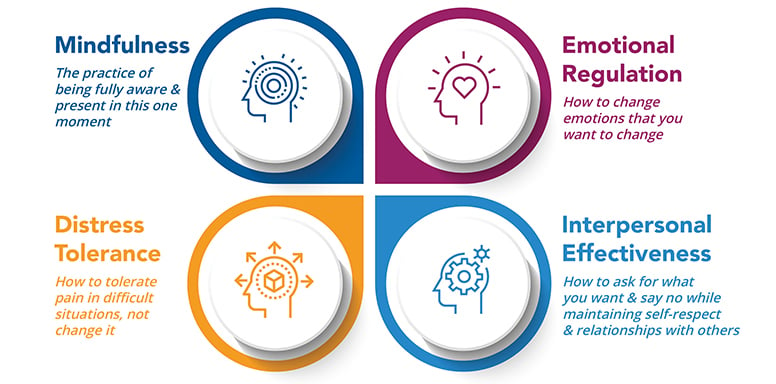What is DBT?
Dialectical Behavior Therapy (DBT) is an evidence-based treatment designed initially in the 1980s by Marsha Linehan, Ph.D., for individuals with borderline personality disorder (BPD). It was developed to treat high-risk behaviors among individuals who had poor prognoses. In addition, DBT therapists may help reduce extreme emotional suffering and increase effective coping behaviors. Early research on its effectiveness comprised individuals with numerous diagnoses, and efficacy studies indicate that DBT is an effective and flexible treatment for clients with complex behaviors and high rates of comorbidities.
Dialectical Philosophical Processes
DBT focuses on living in the moment, developing healthy ways to cope with unpleasant emotions, learning how to be flexible with our feelings, and improving our relationships with ourselves and others. The philosophical perspective of dialectics influences DBT. Mental health professionals work with their clients to assist them with holding two opposite views at once.
DBT believes that
- Our thoughts, beliefs, and behaviors are connected to our moods, physical experiences, and events in our lives.
- Change is constant, and we cannot avoid it or stop it.
- Opposite thoughts and feelings can be combined to form a thought/feeling that is better suited.
How Does DBT Work?
DBT teaches strategies, methods, and skills that are helpful with mood problems such as sadness, anxiety, anger, panic, jealousy, guilt, and shame. The skills taught can help solve relationship problems, handle stress better, improve self-esteem, become less fearful, and grow more confident. The dialectic at the heart of DBT is acceptance and change. This unique aspect of DBT brings together these two opposites in therapy to bring better results than one alone.

Mindfulness
- Be in the moment
- Acceptance based
Emotion Regulation
- Identify and deal with emotions
- Change based
Distress Tolerance
- Cope with super-strong emotions
- Acceptance based
Interpersonal Relationships
- Set boundaries and communicate clearly
- Change based
DBT Techniques
DBT strategies leverage various techniques to achieve treatment goals.
Individual Psychotherapy
The goals of individual therapy are to reduce life-threatening behaviors, reduce therapy interfering behaviors, decrease quality of life interfering behaviors and increase behavioral skills. The clinician will utilize diary cards to inform what must be addressed in each session. A behavioral chain analysis identifies links (thoughts, feelings, behaviors, external events) that led to problem behavior and consequences. Then a solution analysis is completed to determine intervention points to prevent the maladaptive behavior from recurring. Individual therapy relies on clinicians increasing clients’ commitment to trying new behavior.
Skills Training
Skills training usually happens weekly in a group format and is concurrent with individual therapy sessions. These groups are psychoeducational and teach Mindfulness, Interpersonal Effectiveness, Emotion Regulation, and Distress Tolerance.
Telephone Consultations
Telephone coaching is used as needed to help clients generalize skills outside of the therapy room. Clients will call their clinician when they need help utilizing a skill or do not know what skill to use.
Therapist Consultation Team
The consultation team is in place to increase clinicians’ motivation and help deliver competent and effective treatment and adhere to DBT principles.
For more information, visit the next blog in our DBT series Pros & Cons of DBT.






















